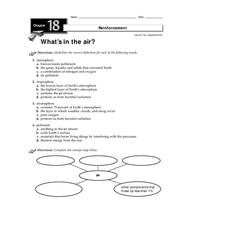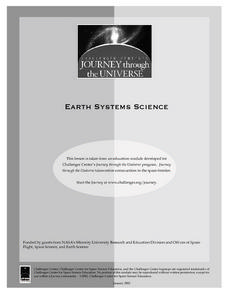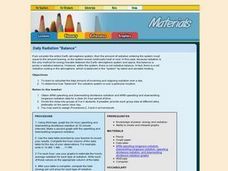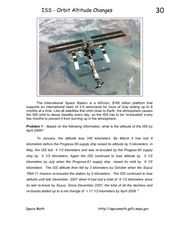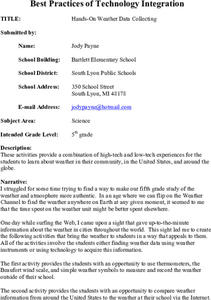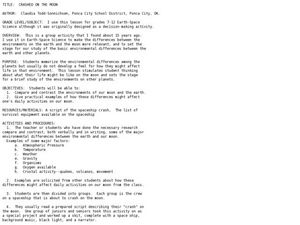Curated OER
The Air Around You
In this air worksheet, students will answer questions about the Earth's atmosphere, including the layers, air masses, and heat transfer. Students will explore how the difference in atmospheric temperature can create weather patterns....
Curated OER
Resources for Teaching about Biogeochemical Cycles
Students study the different cycles and Earth's systems. In this investigative lesson students study the nitrogen and carbon cycles, play a game pertaining to it and also participate in a class activity.
Curated OER
What's in the Air?
In this air instructional activity, students will choose the correct definition for atmosphere, troposphere, stratosphere, and pollutant. Then students will complete a concept map showing what components make up air. This instructional...
Curated OER
Weather: It Works, or Not?
Students discover the techniques meteorologists use to examine the atmosphere. In groups, they build their own weather station and observe the various weather conditions. They identify the types of weather patterns that allow the...
Curated OER
Energy from the Sun
In this energy activity, students complete a chart on the three types of heat transfer and their causes. Then they explain why all of the radiation directed at Earth does not reach the surface. Students also explain the factors in the...
Curated OER
Biosphere Socratic Questions
Young scholars examine the origin of life on Earth and its evolution through geologic time by participating in a whole class discussion. They respond to prompts that lead them to conclusions about the interactions among the biosphere and...
Curated OER
Asteroids
Students examine the different types of asteroids and how they enter the atmosphere. In this space lesson students use mashed potatoes to create an asteroid they can eat.
Curated OER
Daily Radiation "Balance"
Young scholars explore the amount of radiation in the Earth's atmosphere. They calculate the total amount of incoming and outgoing radiation over a day and determine how "balanced" the radiative system is over a particular location.
Curated OER
Stratospheric Ozone
Students explore about the structure of Earth's atmosphere and about the stratospheric ozone. They discuss how it is produced and destroyed, where it is located, why it is important, and how it is changing. Students investigate about...
Curated OER
Feeling Pressured
Students explore pressure in our atmosphere. They examine the relationship between pressure and depth. Students construct an experimental apparatus and take measurements. Students evaluate the impact of pressure on the lungs.
Curated OER
Movement of Air II
In this movement of air worksheet, students determine the deflection of air masses that result from Earth's eastward rotation. Then they describe what winds provide for different trades. Students also identify and describe the imaginary...
Curated OER
As the Sun Burns
Students examine the types of light the sun gives the Earth. They describe the electro-magnetic spectrum and how to protect themselves from different types of light. They identify the layers of the atmosphere as well.
Curated OER
Weather and Atmosphere
Seventh graders explain the layers of the atmosphere. They identify the causes of air pollution. They analyze real world weather data. They explore and describe clouds. They develop models to explain atmosphere and weather.
Curated OER
What Makes you Hot?
Students manipulate different variables in a model and make inferences about the temperature on Earth. In this heat lesson students calculate the blackbody radiation of an object at a certain temperature.
Curated OER
The Layers of the Atmosphere
In this atmosphere worksheet, students read about the four distinct layers of the atmosphere. Then students complete 3 short answer questions.
Curated OER
Writing about the climate
Students research the contributing factors to the Earth's paleoclimate. They determine the relevant climate data and use it to construct a science argument. In the process, they access data, capture images of the data plots, and...
Curated OER
Our Savage Planet in the News
Students research volcanoes, storms, atmospheric conditions, etc., find information and collect facts, create a simulation of a science news broadcast, watch a video clip of an avalanche, and create an artistic rendering of one naturally...
Curated OER
ISS-Orbit Altitude Changes
In this ISS-Orbit worksheet, students read about the International Space Station and determine the altitude of the station on April 2009 given the re-boosting necessary to prevent the Space Station from burning up in the atmosphere.
Curated OER
Pangaea Puzzle
Students explore plate tectonics and the formations of the Earth's surface and why maps are distorted. In this Earth's surface instructional activity students complete a lab and answer questions.
Curated OER
Hands-On Weather Data Collecting
Fifth graders use Internet sites to complete a study of weather and atmosphere. They compare weather data from cities around the world. They use thermometers, the Beaufort wind scale, and simple weather symbols to measure weather around...
Curated OER
Cosmic Rays
Pupils study cosmic rays and the energy behind them. In this atmospheric instructional activity students complete a cosmic ray telescope project.
Curated OER
Crashed On the Moon
Students compare/contrast the environments of our moon and earth, and examine examples of how these differences would affect their daily activities on our moon. They develop lists of emergency supplies to bring if their spaceship crashed...
Curated OER
The Inner Planets
In this planets activity, students review the characteristics of the inner planets: Mars, Venus, Earth, and Mercury. This activity has 15 multiple choice questions.
Curated OER
Earth's Hydrologic Cycle
Students examine the water cycle. In this hydrologic cycle lesson, students follow the provided procedures to demonstrate the how water moves around the planet through the dynamics of the water cycle.




